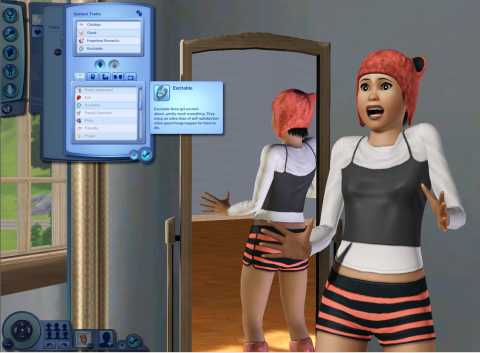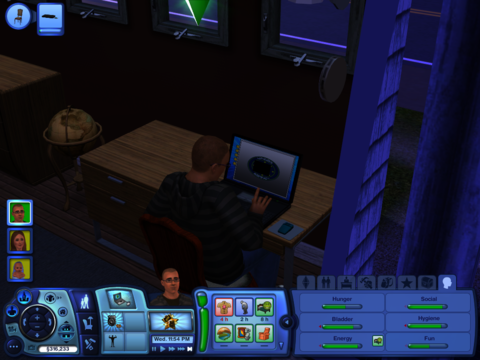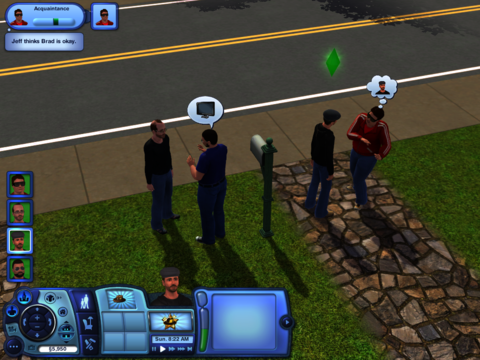
Because there are so many different ways to play The Sims, I feel like it's worth shedding some light on how I've tended to approach the series, which I suspect is somewhat atypical and maybe a little sociopathic. Generally speaking, I've always treated The Sims as more of a game than it's probably intended. I'll focus my efforts on a single sim, with the self-imposed goal of maxing out my sim's skill meters, career path, and relationship status. Interior design and playing dress-up are of little concern to me, unless it's for stuff that has a significant impact on my sim's personal growth. For this reason, I rarely expand on the modest house you start out with, unless it's to fit more functional stuff in there. I treat social interactions strictly as opportunities to get all the other sims in the neighborhood to be hopelessly infatuated with my sim. Like I said, a little sociopathic, and maybe more of a glimpse into my own psyche than I'd care to admit.
There's nothing about The Sims 3 that would stop me from playing this way, and it doesn't appear to have done anything to disrupt any other play styles you might've become accustomed to. You can still treat your sims as little automatons that you micromanage and force to behave in whatever weird, transgressive fashion you see fit. But what's most interesting to me is that, in addition to a myriad of sliders to determine what your sim looks like, part of The Sims 3 character creation process now involves giving them some personality traits of their own. There are dozens to choose from, both good and bad, as well as the gloriously broad field of grey in between. You can make your sim the apex of perfection if you so desire--an athletic, charismatic achiever who's a great kisser and handy around the house--or you can go with a barely-functional social pariah who mooches off friends, hates the outdoors, and breaks down at the first sign of adversity. Personally, I found somewhere in the middle to be the most interesting.

The unique combination of personality traits you choose will go on to inform both your sim's everyday and lifetime wishes. Everyday wishes will pop up on the game's menu bar as you play, and can include improving your relationship with another sim, getting a promotion at work, spending some time watching TV, or ordering a pizza. Lifetime wishes are more significant, usually concerning maxing out certain skills or professions. Fulfilling both the everyday and the lifetime wishes earn you points that you can then sink into various perks for your sim, ranging from free lunches for life at restaurants to a teleportation pad that lets you travel anywhere instantly. I feel like the wishes help provide some focus to the gameplay in The Sims 3, even if the implementation is a little contrived at times. You can only have four active everyday wishes at a time, which makes a certain amount of sense, though my hunger for points lead me to choose the wishes that were easier to fulfill rather than the ones that were potentially more interesting. Again, this might speak more about me as a player than The Sims 3 as a game.
There's better technology under the hood in The Sims 3, which makes it an incrementally better-looking game than The Sims 2, though it also allows for a more seamless world. The insides of most non-residential buildings are still a mystery, which only really seems like a significant missed opportunity when it comes to your workplace. You'll need a nine-to-five to keep the fridge full and the bills paid, and as with past entries, the specifics of your workday are still a bit of a sausage factory, though you can choose, on a day-to-day basis, whether to bust your ass, suck up to the boss, socialize with coworkers, or just take her easy, which can impact both your sim's mood at the end of the day, as well as your sim's job performance.

A lot has changed in The Sims 3, but for all the technical refinements, gameplay additions, and online integration, it still scratches the same basic itch that its predecessors did, though it arguably does it with an improved effectiveness. EA has done a terrific job of listening to what the existing players wanted while also making a more inviting experience, which is an impressive balancing act indeed.